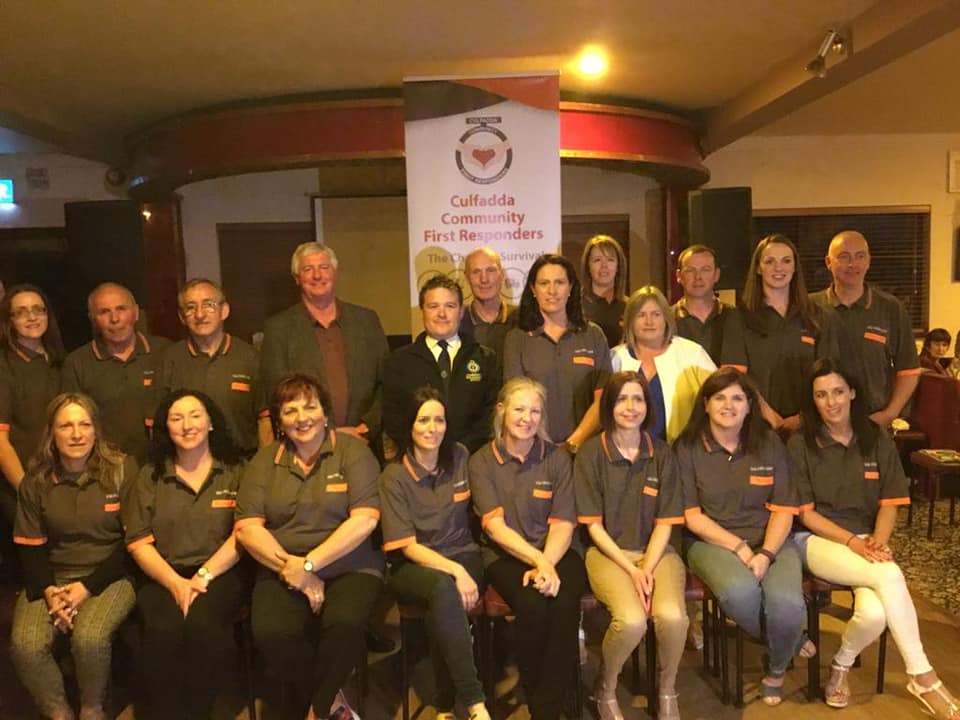The Culfadda Community First Responder Group is a voluntary group linked with the National Ambulance Service (NAS).This group is governed by the NAS Community First Responder Scheme (NASCG007-See Attached). All responders are trained and certified to the Pre Hospital Emergency Care Council (PHECC) Cardiac First Responder National Standards.
Once a 999 call is made for a person suffering from Cardaic Arrest or Choking within a 5km radius of Culfadda village, the Community First Responders are immediately notified by text from the National Emergency Operations Centre (NEOC) of the local emergency. The First Responders then immediately respond to the call and provide emergency care in the form of CPR and use of an Automated External Defibrillator (AED) on the patient until Ambulance Service arrive.
In March 2020, all Community First Responder Groups were stood down by the National Ambulance Service as a consequence of COVID 19. All groups remained off call and awaited further guidance. In December 2020, the NAS released the Post COVID 19 Reactivation Policy for Community First Responders (See attached). Following the release of this document, reactivation of the Culfadda Community First Responders was discussed both at committee level and within the wider group itself. A COVID 19 risk assessment of all 25 members was undertaken and weekly zoom meetings took place. Following this assessment, 15 of our members met the criteria to volunteer for “on call” service again in accordance with the NAS Post COVID Reactivation Policy. Since January 2021, these 15 members have undertaken rigorous online training in the form of Critical Incident Stress Management, Infection Control, HIQA Standards, Risk Assessment, Decontamination Post Call, Hand Hygiene and PPE training. Since February the group have attended workshops and undertaken practical assessments under the direction of National Ambulance Service Community Engagement Officer to ensure each member is trained to the same standard of PPE as that of the National Ambulance Service Personnel. In essence, it is the requirement that each First Responder treat every patient as a COVID 19 positive case and hence are required to wear the same level of PPE as the Ambulance Personnel.
“Time is of the essence in a cardiac arrest situation and considering that a person’s chance of survival decreases by 10% for every minute without CPR, then the survival chances for people suffering a cardiac arrest in our rural locality are really quite dismal without timely intervention before the arrival of the National Ambulance Service”
“Those odds can be reversed if training, education and resources are made available to members of the local community, and that’s precisely what Culfadda CFR group have set out to do”
Working within the framework guidelines set by the National Ambulance Service Community First Responder Scheme, the Culfadda Group consists of local volunteers all of whom are now trained in CPR and the use of Defibrillators.
It means that once a 999 call is made to Ambulance Control from the Culfadda catchment area, a text alert is activa giving essential information such as Eircode and/or address of the patient, as well as the age and condition of the person requiring assistance.
The text message goes to all of the first responder phones on the Culfadda Community First Responder Group, and the trained responders swing into action, bringing life-saving equipment such as defibrillator and other emergency equipment to the scene of the incident, saving vital time in the battle to preserve someone’s life.
The first responders maintain contact with ambulance control and provide the necessary emergency care until the ambulance services arrive at the scene, at which time the patient is handed over to the care of the professional paramedics.
“Essentially, because of the rural locations, members of the local first responder group maybe in a position to reach the patient quicker than the ambulance service, and provide the necessary care to help the patient until the professionals arrive. These minutes can be vital.
The group estimates it will cost in the region of £16,000 to get the scheme fully up and running. Local fund-raising has enabled the purchase of two defibrillators which are strategically located throughout the region, as well as training and emergency equipment. And this week almost 7,500 euro in funding was approved by Sligo LEADER allowing the group to purchase another four defibrillators for the area.
“A huge effort has gone into making this project a reality ,and without the work and support of the committee and local community it would not have been possible. The village of Culfadda is very fortunate to have such highly committed and motivated volunteers providing such an essential service. We are fully trained and equipped to respond to every call.”

